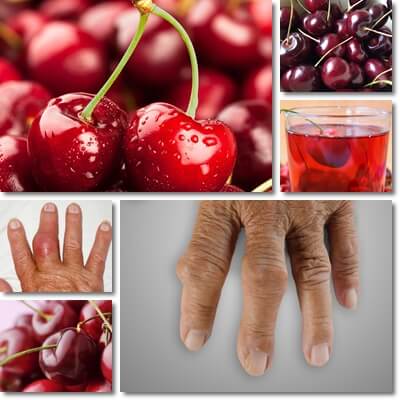If there’s a list of anti-inflammatory foods, cherries are definitely on it. Plenty of studies have shown sweet and especially tart cherries and cherry juice are good for inflammatory conditions such as gout.
How is eating cherries and drinking cherry juice good for gout? Regular consumption of the fruit or its juice helps reduce inflammation markers in the body such as Interleukin 6, Interleukin 8, tumor necrosis factor alpha and the cyclooxygenase-1 and cyclooxygenase-2 inflammatory enzymes. Components occurring naturally in cherry fruit and juice further exert hypouricemic effects, lowering uric acid levels in the blood and reducing the incidence of flareups.
What is gout?
Gout is a type of inflammatory arthritis characterized by the inflammation or swelling of the joints, but also tendons and adjacent tissues, and the associated pain sensation. Gout is caused by high levels of uric acid accumulating in the blood, a condition known as hyperuricemia. Having too much uric acid in the blood leads to deposits in joints such as the joints of the big toe, finger joints or the joints of the wrists or knees.
These deposits of crystallized uric acid, called uric acid crystals, cause swelling and pain, but also other symptoms such as localized redness and a burning sensation of the affected joint and, more rarely, tiredness, fatigue or fever.

The causes for gout are primarily genetic. However, underlying medical conditions such as kidney damage and kidney disease, but also hypothyroidism, diabetes, being overweight or obese, insulin resistance and high blood pressure, as well as some medication used for treating these conditions, represent important risk factors for gout. Diet accounts for a relatively small part of all gout cases (around 10-15% of total gout cases), but is often the driving force behind flareups in those with the established disease. At the same time, diet and lifestyle changes are one of the best solutions for treating gout and reducing the incidence of flareups.
Is eating cherries and drinking cherry juice good for gout?
Eating cherries and drinking cherry juice is good for gout and one of the few tested and proven dietary solutions for gout management. How exactly does eating cherries or drinking cherry juice help gout? For one, cherries and cherry juice have scientifically proven anti-inflammatory properties and regular consumption can help reduce swelling and associated pain in gout. This is achieved by reducing inflammation markers in the body.
Studies also show cherries and cherry juice have hypouricemic action, lowering high uric acid levels in the blood which helps improve gout and reduce the risks of gout attacks. Finally, the fruit and its juice are low-purine.
The low purine content of cherries and cherry juice promotes favorable outcomes in gout because it does not increase the production of uric acid, compared to high-purine foods.
Of course, it’s important to understand that gout is a multifaced condition and there is no universal approach when it comes to treatment or management. Gout is primarily treated with medication aimed at lowering uric acid levels in the blood either by blocking or reducing the production of uric acid or increasing elimination of uric acid in the urine. NSAIDs, corticosteroids and application of ice on the affected areas to reduce swelling and calm pain are the recommended courses of action in gout flareups.
However, treatment with medication is not as successful by itself as treatment with medication supported by drastic lifestyle and dietary choices such as weight loss and eating a low-purine diet (purines are components occurring naturally in foods such as meats and seafood which increase uric acid levels in the blood and worsen gout).

Benefits of cherries and cherry juice for gout
Regular consumption of fresh cherries, cherry juice, concentrated cherry juice and cherry extract help with gout and provide various therapeutic effects that contribute to the management of the condition and a reduction in the number of flareups. Read on for the three reasons why it’s good to include the fruit in your diet to reduce the risks of gout flareups by up to 75%.
(1) Anti-inflammatory benefits
Sweet and tart cherries are on every list of anti-inflammatory foods. And for good reason. Studies show consumption of the fresh fruit, fruit juice or extract holds benefits for inflammatory conditions such as rheumatoid arthritis and gout.
One study of 633 individuals with gout observed that cherry intake over a 2-day period was associated with a 35% lower risk of gout attacks compared with no intake. The same study observed that cherry intake combined with the use of anti-gout medication (allopurinol) reduced the risk of gout attacks by up to 75%.
Research shows cherries and cherry juice and extract lower inflammation markers in the body, including Interleukin 6, Interleukin 8, tumor necrosis factor alpha and the cyclooxygenase-1 and cyclooxygenase-2 inflammatory enzymes which would explain the benefits observed for gout.
The anti-inflammatory effects of cherries and cherry products, especially tart cherries, are owed to pigmented antioxidants known as anthocyanins which have demonstrated strong inflammation-reducing properties (source 1, source 2). To a lesser extent, the anti-inflammatory effects of the fruit and fruit juice are owed to vitamin C (but the fruits and juice are not quite the best food sources of the vitamin).
Consumption of sweet cherries of the Bing variety for 28 days (280 grams of cherries per day) caused circulating concentrations of C-reactive protein to decrease, and the decrease in the inflammatory marker continued even after consumption was discontinued (source).
However, this does not mean that only Bing cherries are good for gout. It means that this particular study focused on Bing cherries, likely because it is one of the most commonly eaten varieties of the fruit, but similar benefits for gout should be observed from eating other types of cherries too.
While some would argue that sour or tart cherries are the best cherries for gout, rheumatoid arthritis and other inflammatory conditions, sweet cherry varieties have exhibited impressive anti-inflammatory benefits too and should be considered an equally important food to include in any healthy diet.
(2) Hypouricemic benefits
Another reason cherries and cherry juice are good for gout is because of their hypouricemic effects. That is, the fruit help lower uric acid levels in the blood. Uric acid is a waste product of normal metabolism, resulted from the breakdown of purines from food.
It is primarily eliminated through urine by the kidneys (this is also why kidney disease is a risk factor for gout).
If too much uric acid accumulates in the blood, either because too little is eliminated or too much is produced, or both, gout installs.
Typically, uric acid crystals form in joints and the adjacent tissues, triggering inflammation and subsequent swelling, redness and pain in the affected area.
Medication for gout deals with lowering uric acid levels in the blood, but the prospect of life-long treatment with medication that is a source of side effects, not just benefits is not something to look forward to.
Fortunately, studies show that cherries and cherry juice also lower uric acid levels in the blood. The hypouricemic effects have been confirmed for both sweet and tart cherries, and studies conducted on Bing cherries and Montmorency cherries.
In one study, eating of two servings of sweet cherries of the Bing variety (approximately 45 fruit pieces) caused levels of blood urate – a salt of uric acid- to lower by 14% after 5 hours, and urinary elimination to increase at 73% after 3 hours.
In another study, consumption of 30 ml (1 oz) or 60 ml (2 oz) of tart cherry concentrate resulted in a 36% decrease in blood urate levels and a 250% increase in urinary elimination of the metabolite.
At the same time, there are studies that show no effects of cherries or cherry juice consumption on blood urate levels, although they show a marked decrease in the incidence of gout flareups indicating real benefits of cherry and cherry juice consumption for gout management.
(3) Low-purine food
There are several reasons why cherries help fight gout and one of those reasons is they are a low-purine food. Purines are components occurring naturally in food, but which get broken down into uric acid. Accumulation of uric acid in the blood above a certain level results in deposits of uric acid crystals in joints and adjacent tissues which activates inflammatory markers and causes swelling, redness and pain.
Lowering uric acid in the blood to normal levels is equivalent to curing gout and preventing painful flareups. This is typically achieved with a combination of gout medication and a healthy diet and lifestyle. Eating more low-purine foods such as cherries and other fruits and vegetables and less high-purine foods such as meat, especially game and organ meat, and seafood is highly advised in gout.
By being naturally low in purine, cherries and their byproduct, cherry juice, do not contribute to gout flareups. But because they are also anti-inflammatory foods and have uric acid-lowering properties, cherries and cherry juice also actively help reduce inflammation markers and uric acid levels in the blood and fight gout. Also see what foods to eat and to avoid for gout.
Fresh cherries, cherry juice or cherry concentrate for gout?
What are the best cherry varieties for gout: sweet, sour, red, yellow or black cherries? What is the best cherry juice for gout? Are the fruits better than the juice? What about juice from concentrate or cherry extract? These are all valid questions to ask yourself if you are considering cherries or cherry juice for gout management.
Of all the studies performed up until this point, it’s clear that cherries as well as their byproducts have real benefits for gout, both short and long-term.
But more research is needed to determine if the fresh fruit, fruit juice, juice from concentrate or extract is better and what intake produces the best results.
The only thing that can be said for certain right now is that cherries in general are a healthy fruit and a good food option for a healthy diet. Their nutritional makeup and biologically active components profile hold benefits for inflammatory conditions such as gout.
One thing to consider though: both the fruit pulp and skin are sources of benefits for gout so it’s a good idea to not discard the cherry skin because it would cause you to lose important antioxidant components that would help in the fight against gout.
